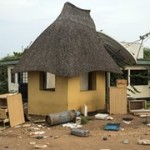By Alicia Luedke

The incident at Terrain Hotel in the capital of South Sudan, Juba in July of this year, in which a number of aid workers were raped by government soldiers highlighted the risks that aid workers, particularly female aid workers face in high-risk areas. This is by no means intended to overshadow the horrific levels of sexual violence experienced by nationals in places like South Sudan, but the incident at Terrain has thrown new light onto the security challenges that expatriates face in today’s conflict zones, including international researchers - providing an important window of opportunity for discussions around gender and security in high-risk fieldwork.
Yet, as I stated in the 2016 WIIS sponsored Missing Peace Young Scholars Network forum, as researchers start engaging in discussions about the various risks that both females and males face in the course of their fieldwork (recall the brutal murder of the Cambridge PhD student in Egypt earlier this year), these discussions need to be conducted in an unbiased way that does not reinforce patriarchal gendered stereotypes. As a recent article in the Guaridan Higher Education Network highlighted, “[w]omen need to be empowered to do the research that matters, where it matters.” At the same time, the security personnel tasked with training expatriates working in high-risk areas cannot continue to claim that, “rape, particularly when perpetrators are in armed groups, cannot be prevented.”
We need to recognize and protect aid workers and researchers from risks like sexual assault, but that cannot be accomplished through blanket bans on female researchers or restrictions on the movement of female staff. Indeed, as a colleague of mine and I recently wrote in a blog post, there is a clear deficit of accurate information on the damages of war in places like South Sudan and Syria and while crackdowns on freedom of expression and movement, violent intimidation and the deliberate obstruction of researchers make research-related work difficult in these sorts of settings, it also makes it all the more important.
I am interested in collecting initiatives happening at universities in North America, or elsewhere in the world where there are unbiased discussions, or policies being developed for addressing women and men’s security concerns in high-risk fieldwork and best practices for dealing with gender-specific risks, such as sexual assault?
Please contact me at Alicia.Luedke@gmail.com
